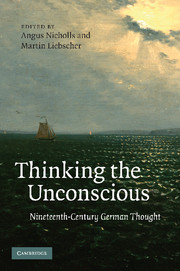Book contents
- Frontmatter
- Contents
- Notes on contributors
- Introduction: thinking the unconscious
- 1 The unconscious from the Storm and Stress to Weimar classicism: the dialectic of time and pleasure
- 2 The philosophical significance of Schelling's conception of the unconscious
- 3 The scientific unconscious: Goethe's post-Kantian epistemology
- 4 The hidden agent of the self: towards an aesthetic theory of the non-conscious in German romanticism
- 5 The real essence of human beings: Schopenhauer and the unconscious will
- 6 Carl Gustav Carus and the science of the unconscious
- 7 Eduard von Hartmann's Philosophy of the Unconscious
- 8 Gustav Theodor Fechner and the unconscious
- 9 Friedrich Nietzsche's perspectives on the unconscious
- 10 Freud and nineteenth-century philosophical sources on the unconscious
- Epilogue: the “optional” unconscious
- Works cited
- Index
- References
7 - Eduard von Hartmann's Philosophy of the Unconscious
Published online by Cambridge University Press: 04 August 2010
- Frontmatter
- Contents
- Notes on contributors
- Introduction: thinking the unconscious
- 1 The unconscious from the Storm and Stress to Weimar classicism: the dialectic of time and pleasure
- 2 The philosophical significance of Schelling's conception of the unconscious
- 3 The scientific unconscious: Goethe's post-Kantian epistemology
- 4 The hidden agent of the self: towards an aesthetic theory of the non-conscious in German romanticism
- 5 The real essence of human beings: Schopenhauer and the unconscious will
- 6 Carl Gustav Carus and the science of the unconscious
- 7 Eduard von Hartmann's Philosophy of the Unconscious
- 8 Gustav Theodor Fechner and the unconscious
- 9 Friedrich Nietzsche's perspectives on the unconscious
- 10 Freud and nineteenth-century philosophical sources on the unconscious
- Epilogue: the “optional” unconscious
- Works cited
- Index
- References
Summary
In the second volume of Baldwin's Dictionary of Philosophy and Psychology, published in 1902, the following is given as the entry for the concept “unconscious”:
Unconscious (the, philosophy of): Ger. Philosophie des Unbewussten. The metaphysical system of E. v. Hartmann, by whom the absolute principle is called “the Unconscious.”
“According to v. Hartmann (Philos. d. Unbewussten, 3) the unconscious is the absolute principle, active in all things, the force which is operative in the inorganic, organic, and mental alike, yet not revealed in consciousness (ibid., 365). It is the unity of unconscious presentation and will (ibid., 380) of the logical (idea) and the alogical (will). The unconscious exists independently of space, time, and individual existence, timeless before the being of the world (ibid., 376). For us it is unconscious, in itself it is superconscious (überbewusst)” (Eisler, Wörterb. d. philos. Begriffe, “Unbewusst”).
This is both a succinct summary of Eduard von Hartmann's leading ideas, and an index of his remarkable historical success − the relevant volume of the Dictionary was published thirty-four years after the appearance of the first edition of the Philosophy of the Unconscious (Philosophie des Unbewussten) in 1868, and at a time when unconscious ideas and inferences had a well-established place in psychology, yet Baldwin allows the concept of the unconscious to be identified exclusively with Hartmann's conception of it.
- Type
- Chapter
- Information
- Thinking the UnconsciousNineteenth-Century German Thought, pp. 173 - 199Publisher: Cambridge University PressPrint publication year: 2010
References
- 6
- Cited by

